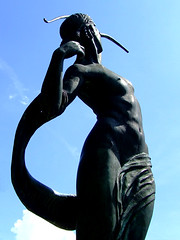
The statue stands there, perfectly still, as though it’s not alive. As though it doesn’t breathe. As though no soul resides inside.
It’s a statue of a goddess, half naked, bow in hand, poised as though she’s already released the arrow. Straight up; and every twenty or so years, when the moon’s trajectory is just right, and if the cloud cover is light, that arrow, should it be flying, aims at the heart of the moon.
I remember the moment well, when I captured this goddess, when I rendered her into stone. See, the Greek pantheon, and others, roamed the earth a long time after losing their power, and a great many of them died in the early years. They fell victim to their own boasting, their conceits, their stupid belief in their infallibility. When I found Diana, who had taken the Roman name in this modern age, her smiles were sad, her heart heavy, her face showing signs of age that she’d never seen before. Wrinkles, in the face of a goddess!
Despite my assurances that her self-perception was skewed, that she was indeed a beauty beyond compare, that the centuries had not weathered her in any way, she refused to believe me. But she let me buy her a drink. And she let me talk her into breakfast.
She didn’t know I’d been tracking her, trailing her, tracing her from one city to another. She was tired and beaten and pre-disposed, I guess, to hear what I had to say.
After a few weeks, I admitted to her one tiny lie. “I can restore you.”
Her eyes lit up then. She was so happy. She was, indeed, restored, rejuvenated, reinvigorated by the very concept. The few signs of age she might previously have worn were gone now, dissolved by her own excitement. Because she believed me. Because I made her believe, and let her believe, and led her to believe. I promised the world. The moon, even, to this woman who once was the moon.
I’d shown her things already, things that helped her believe. And once I had her belief, the rest was rather easy.
She posed for me, that fateful night. I had a camera. It was state-of-the-art, then, though it required quite a long exposure at twilight. She loosed that arrow, and I pulled the trigger. The camera, of course, was a ruse. She believed in that, too.
I still have the photograph. Perhaps I’ll show you one day.
Everything else having been in place, I watched the arrow fly, straight as an arrow is wont to fly, into the upper reaches of the stratosphere before I simply could not see it anymore. She knew the distance, the angle, the wind conditions; there has never been a more skilled hunter than Diana.
She, however, did not get to watch the arrow. The instant she loosed it, my trap sprung, and I had her.
Now, you should understand something, because this is important. I didn’t capture her to steal her skill, or her breath, or her Olympian aptitudes. I didn’t intend to ransom her. And certainly I wouldn’t kill her; I have a thing for beauty. I kept her in the garden. Of course, I couldn’t move her; that would disrupt the field and release her. As it is, she’s a statue in my garden, a perfect rendition attributable to no artist, and she’s mine. I found her, and captured her, and I keep her now, because I can.
A guy’s got to stay true to his nature, don’t you think?
Anyhow, it’s been a few decades, so it’s time. I’ve got this great cover story. I know who to blame, and how to do it so she still believes me. That’s the trick: can I keep her believing? Can I make her see the things I want her to see? My brethren, the giant with the red beard, still laughing and still fighting, still pompous and egotistical and unbearably smug, still lives in Stockholm.
As the moon reaches that spot, not where it was when Diana loosed the arrow but when it struck the moon’s heart (her own heart, in fact, a sacrifice I convinced her was necessary and inconsequential), I release the trap.
Diana blinks. Diana lowers the bow and draws a deep, deep breath. She looks at me and blinks again and says, “The years have not been kind to you, Loki.”
She draws another arrow, though there was none to be seen, and shoots me before I can say a word. The arrow strikes my chest and cracks my heart. I’m stunned. I’m speechless. I’m on my back in my own garden, staring up at the moon, and the face of the wild beauty. She kneels beside me, kisses my forehead, and says, “You made me blind, in your trap, but not deaf. My brother, every day, and Iris after every rainstorm, whispered of your treachery.
“The poison in that arrow will take days to kill you,” she says, pressing a blade to my throat. Where does she get these wonderful weapons? “I can make it quick, if you tell me why.”
I give her a pained smile. “Why I captured you?”
“Why you released me.”
“Same reason,” I say. “Because I could.”
Despite her promise, she does not slice my throat. She leaves me. I’m helpless, unable to move. I can move my eyes. I can blink. I can speak, though it hurts, but the strength flows from my limbs.
Clouds, I suddenly realize, have drifted over the face of the moon. Thick clouds. Heavy clouds. Heat lightning flashes, without sound, three or four times, but I know what’s coming. The first real bolt I see strikes the very spot on which Diana had stood, though there are higher things to attract the lightning. It is followed, of course, God help me, it is followed by thunder.
Leave a Reply
You must be logged in to post a comment.